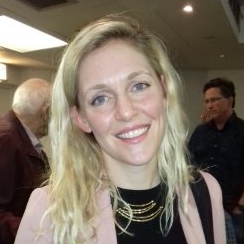News
Committed to protecting women in conflict zones
Dr Orly Stern moves from one conflict zone to the other, attempting to fulfil her life’s passion of achieving equality for women. However, she has to concede that this is easier said than done in the largely patriarchal areas in which she finds herself.

MOIRA SCHNEIDER
A Capetonian, Stern holds an LLM (Master of Laws) in international human rights law from Harvard Law School and her special focus is protecting women in conflict. She shared her experiences on Sunday 15 July at the Mandela Day talk series put together by Mensch, a non-profit which works to build a community of change-makers.
She spent two years working in Iraq as a consultant. She describes this as “one of the most interesting experiences of my life”. Stationed an hour away from Mosul, she was dealing with the fallout of ISIS’s devastation of the country.
Working with the one and a half million Syrians and Iraqis in displaced persons’ camps, she was engaged in a humanitarian operation with experts from around the world.
She worked in a “one-stop shop” centre where women could come if they experienced gender violence. “We would provide them with services such as social workers and psychologists – I was the technical specialist making sure that everything ran right and we weren’t doing more harm than good,” she related.
“The vast majority came because of domestic violence which spikes dramatically in these settings.
“They had no family, no skills and were barely surviving on the aid. How do you help in a situation where women are probably going to be worse off without their husbands?”
Women who had been in sexual slavery often came to the centre for help, presenting with psychological, gynaecological and stomach problems. “They would be incredibly private about that because of the great shame and stigma of having sex out of wedlock.
“Some families welcomed them back but others didn’t.”
But Iraq is just one of the many conflict zones in which she has worked. As an indication of her hectic work schedule, Stern returned to Cape Town from Mogadishu (Somalia) two weeks ago and was due to leave for Serbia on the evening of the day she spoke at the event. She was then scheduled to fly to Bulgaria next week. Other places she has worked in include Uganda, Jordan and Iraq.
Stern, who has been engaged in this work for 10 years, admits that it takes a psychological toll. “It’s hard work emotionally,” she says. “You have to take care of yourself and I’m very conscious of that. I do yoga every day and I take holidays.
“You see the best and the worst in conflict zones,” she continues. “I love looking at the women – they’re absolutely stepping up, caring for their families and communities.
“I think (human beings) are crap and unbelievably inspiring.”
Her work in Serbia will comprise attempting to put in place measures to prevent humanitarian aid workers exploiting their beneficiaries, by, for instance, offering food in exchange for sex.
• Other than the talks, the Mandela Day activities included: an African dance class, a Cook-A-Thon, yoga and robotics for kids. All profits will benefit several organisations catering to the underprivileged.